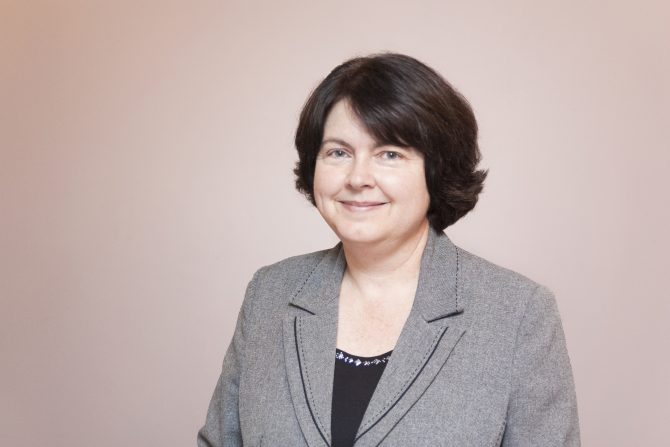
Newfoundland born engineer talks gender equity in engineering
EP&T Magazine
Electronics Engineering diversity engineering equity inclusionAlex Dopplinger, P.Eng. with NXP Semiconductor in Kanata shares her thoughts
Canadian Women in Electronics : Exploring diversity through women in the Canadian electronics engineering and industry profession
Throughout 2020 EP&T explores the topic of diversity in the industry through a series of articles called Viewpoint; stories designed to get readers thinking about gender equity in the engineering profession, allowing others to maybe see their surroundings through a new lens.
Alexandra Dopplinger, P.Eng. is director product marketing – building and energy with NXP Semiconductors in Kanata, Ontario.
What led you into an engineering career?

Alexandra Dopplinger, P.Eng. is director product marketing – building and energy with NXP Semiconductors in Kanata ON.
My favourite subjects were math, physics and music. Memorial University of Newfoundland has an excellent co-op engineering program in my hometown, so it was an easy choice. I didn’t know much about technology at first, but each course and work term guided me toward electrical engineering, which turned out to be an excellent path.
How has your role or career path evolved over the years?
I started as a hardware design engineer with Nortel Networks, which was a great foundation to learn about circuit board design, layout, manufacturing, software, and system verification. Each job since then has flowed naturally to the next – from telecom system product management at Nortel, to software and processor product marketing at Motorola, to leading the factory automation, robotics and industrial segments at Freescale Semiconductor, and now building part of the industrial edge processing business at NXP Semiconductors. I still use the lessons learned in my first job to better understand the perspective of the customers we serve today. I’ve been fortunate to seize exciting opportunities that presented themselves at the right times along the way.
What is your message to female engineers seeking to take on leadership roles?
My advice is the same for all genders. (1) Consider carefully what you want, and then describe it to people who can help you reach your goals. It is easier to succeed when other people understand your plan and can help you achieve it. (2) Leadership roles demand tremendous commitment, so honestly assess your own interests and capabilities to work towards roles that best match your passions. (3) Be open to consider different forms of leadership roles. Many people believe leaders have people reporting directly to them, but my favorite leadership roles involve leading by influence, i.e. without direct reports. (4) Be prepared to fail and learn from those failures. The first few times I tried to lead people who did not report to me, the level of resistance was off the charts. Then I found ways to do it without anyone realizing what was happening, which meant I achieved the goal, but got no credit for it. Then after a few times like this, I was able to describe the hidden steps that led to those signification achievements, which built up my credibility in the organization. Now that my reputation is well-established inside my company and throughout the industry, it is much easier to lead by influence, which leads to my final advice – (5) build mutually supportive relationships with a diverse network of contacts. These are vital to success.
What key words of advice do you have for employers seeking to create a supportive environment for women?
Recognize that female technology employees might face extra headwind to reach their full potential. Mentor and sponsor relationships can be tricky across genders, and there are few female role models. My career always moved fastest when a male leader helped me along, and it seems as if those male leaders’ careers also accelerated at the same time. Who’s to say whether it was cause or effect? Maybe the people who put more value on mentoring a female engineer are also more likely to be successful leaders, or maybe leaders are strengthened by investing in a person with diverse experience. Either way, male leaders should consider that sponsoring a female might benefit their own career too.
What does diversity mean to you and why is it important for engineering?
Engineering 101 is to identify the problem, consider the options, and then implement the ‘best’ solution. New and differentiating ideas flow easier from teams who can leverage a wider range of experience and perspectives. Diversity means success – however you measure it.
Can you share an engineering workplace encounter you’ve experienced, or have been told about, that provides an example of unconscious bias based on gender or race?
In three decades, I have experienced and witnessed countless examples of bias in the workplace. The most compelling example is from a few months ago when I caught myself tuning out the only other female in an important meeting. I was paying careful attention to all the other participants, but suddenly realized that she had less of my attention. It forced me to question why, and to open a dialog with her to help us both figure it out. Now we are strong allies, helping each other identify and overcome unconscious bias in our male-dominated environment.
How should people react to such occurrences when they recognize them?
Say something. When we experience or witness a bias that impedes progress, the organization and the people involved will benefit if we sensitively identify the problem, and respectfully work together toward a solution.
